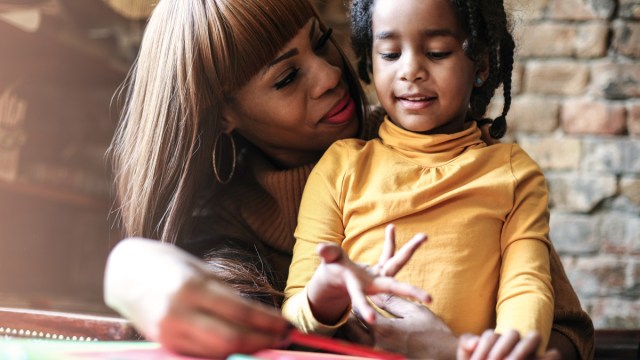The older your kids get, the harder it can be to communicate. That’s why as they grow from toddler to little kid to tween, there are some things we can remember to say to make them feel as confident as possible during those very shaky formative years.
We don’t need to solve all their problems or over direct them every, single, day. Some little phrases can make them (and us) slow down a little and remind our kids that nobody’s perfect, and sometimes a little kindness goes a long way.
“Oops”
“‘Oops’ is a very generous word. It erases blame. In a single syllable, it strengthens our relationship by affirming that we believe the other person has good intentions, even when they mess up,” says psychologist Eileen Kennedy-Moore, Ph.D. “‘Oops’ slows us down and reminds us not to jump to conclusions about someone’s personality when they make a mistake.” Mistakes happen, and the way we react to our children can teach them that the world isn’t perfect, and we don’t expect them to be.
“I trust you”
As our kids get older, they need to know that we recognize they’re growing into independent beings capable of making good decisions for themselves. This may be hard for us as parents because it signifies a time when we probably need to back off a little—a time when our “babies” no longer need to be babied. “I trust you to make the decision that’s right for you” empowers our children to grow more independent.
“You tried really hard”
By the time my child was three, I was already absolutely overloaded with parental advice. But one piece of that advice has always stuck with me: the directive to never tell kids they’re smart. A Stanford psychologist concluded that when children are told they are smart, they cease trying as hard. They assume intelligence and think they don’t have to put in the work. That might be a little overboard, but the intention is there; we should recognize when our kids have put in hard work and reward the action. (I still tell my kids they’re smart, though, not gonna lie!)
“You are so kind”
Don’t forget to show your kid that you recognize the parts of their personality that make them a good human. When we notice things like kindness and empathy and point them out, our kids are taught that those qualities matter. And there has never been a more important time to teach our kids that those qualities matter. Our kids are growing up being taught more empathy than we ever were—and that’s a good thing.
“I’m sorry”
When we own up to our mistakes and ask for forgiveness, we teach our kids that their mistakes will be forgiven, too. And don’t forget to own up to whatever you’re apologizing for without emphasizing your kid being too sensitive. “Apologizers are not responsible for other people’s feelings, but they are responsible for their own actions, which may have triggered those feelings. ‘I’m sorry you feel__’ implies that the other person’s feelings are the problem rather than the apologizer’s actions,” Kennedy-Moore says.
“It doesn’t need to be perfect”
This is something adults need to hear often, too. Sometimes “finished” is more important than “perfect” and that’s perfectly fine. Think about the ways perfectionism makes your own processes more difficult. Perfectionism can be the enemy of creativity and impose all sorts of anxiety. “You can help your child learn to avoid overdoing by asking, “How much time is this task worth?” Whatever your child can manage to do in that time is probably enough,” advises Kennedy-Moore. “Time is our most precious resource because we can’t get more. We don’t want to give a task more time than it deserves.”
Absolutely nothing
That’s right—nothing. Sometimes what our kids need is for us to stop talking. Actively listening can be hard, but the more we try to do it, the easier it will be for our kids to trust that they can open up to us. “Active listening is a good way to improve your communication with your child,” advises the Centers for Disease Control. “It lets your child know you are interested in what she has to say.” This can be difficult for parents because we always want to “fix” everything, but sometimes the best fix is letting kids get whatever big feelings they’re having out. And they can’t do that if we don’t let them.
Related: The Most Important Things to Say to Your Tween (That Aren’t ‘I Love You’)











